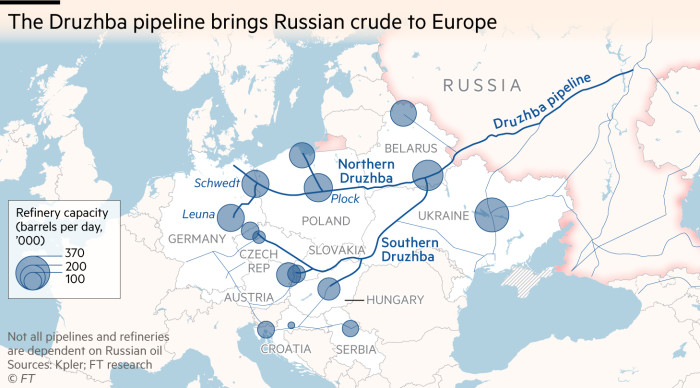[ad_1]
EU leaders agreed to a partial ban on Russian oil imports, while exempting a key supply route to win the support of Hungary, as they seek ways of punishing Vladimir Putin for his war on Ukraine.
The embargo will include oil and petroleum products but will exempt crude delivered by pipeline to Hungary, Slovakia and the Czech Republic, diplomats said.
The deal, which came at a late-night summit in Brussels on Monday, should pave the way for EU agreement on a heavily delayed sixth package of sanctions that also includes measures hitting Russian banks and further individuals.
Charles Michel, president of the European council of member states, hailed the deal in a tweet, saying that it was “cutting a huge source of financing for [Russia’s] war machine” and would deliver “maximum pressure on Russia to end the war”.
But the agreement was only won after weeks of haggling between member states, and at a cost of significant concessions offered to Hungary and its neighbours, as capitals weighed the rising economic costs of multiple rounds of sanctions on Russia.
Olaf Scholz, Germany’s chancellor, said the deal proved that the EU was united. He added: “We have agreed on further far-reaching sanctions against Russia. There will be an embargo on the majority of Russian oil imports.”
Capitals have not settled how long any carve-out of Russian oil supplied via pipeline would last.
The ban will include seaborne oil purchases, which cover about two-thirds of Europe’s imports from Russia. In addition, pledges from Germany and Poland to stop oil imports via the northern part of the Druzhba (Friendship) pipeline, are expected to take coverage of the ban to 90 per cent by the end of the year.
Keeping pipelines out of any embargo has been a key demand of Hungary, which has argued that a ban would put its economy at risk given its reliance on Russian crude. Hungary’s prime minister Viktor Orbán also secured measures to ensure that Budapest can still access Russian oil from other sources if there was an “accident” with Druzhba, which crosses Ukraine.

The partial ban risks distorting competition in the EU oil market, with refineries connected to pipelines from Russia enjoying a price advantage. The price of Russian oil has fallen to a huge discount as European traders have shunned the country’s seaborne crude since the invasion of Ukraine.
If exports via Druzhba are at the pipeline’s maximum capacity of 750,000 barrels a day, it would help Russia earn in the region of $2bn a month from EU buyers.
Russian Urals crude is trading at about $93 a barrel, compared with $120 for Brent, the international oil benchmark. While Russian oil delivered via Druzhba may not carry such a big discount, depending on how contracts are structured, Hungarian oil group Mol has said it has enjoyed “skyrocketing” margins for its refineries since March because of the “widening Brent-Ural spread”.
EU diplomats said there would be a ban on the resale of refined products made from Russian crude as part of efforts to minimise market distortions, with some countries enjoying a longer phase-in period. There will also be a prohibition on offering services, including the financing of oil shipments, diplomats said.
Volumes shipped via Druzhba have actually increased since Russia invaded Ukraine, with buyers in the EU looking to take advantage of the large discounts or to stock up ahead of any embargo.
Argus, an energy-price reporting agency, said that while seaborne shipments from Russia to Europe had fallen by 500,000 b/d, Druzhba shipments had risen by 100,000 b/d in April compared with January and were expected to increase again in May. Hungary has increased shipments by 65,000 b/d while Poland has imported an additional 130,000 b/d, helping to more than offset declines elsewhere.
The sanctions package also includes the ejection of Sberbank from the Swift messaging system as well as restrictions on more state-owned Russian broadcasters and a new round of asset freezes and travel bans on individuals.
Brussels proposed an embargo on buying Russian oil in early May, underlining the EU’s difficulties in finding a way to increase its punishment on Moscow for its war on Ukraine while not damaging parts of the European economy that depend on Russian energy. The EU has already banned Russian coal but exempted gas from sanctions.
However, Gazprom, the Russian state-owned energy company, has cut supplies to Poland, the Netherlands and Bulgaria for refusing to pay for gas in roubles.
Additional reporting by Victor Mallet in Brussels, Eleni Varvitsioti in Athens, and David Sheppard in London
[ad_2]
Source link

